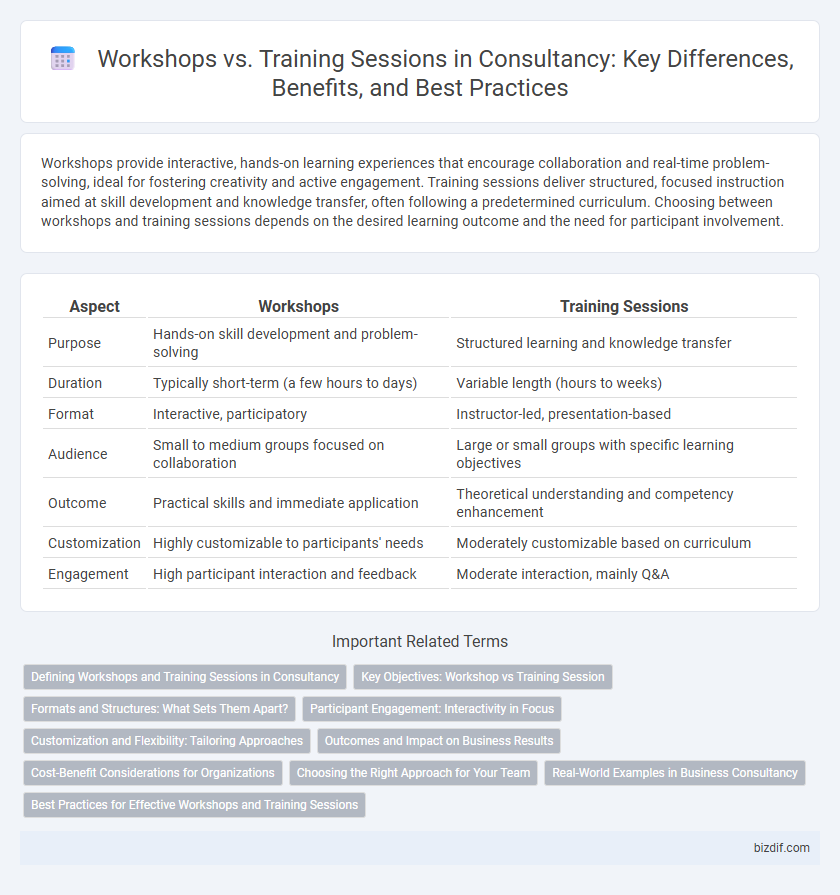Workshops provide interactive, hands-on learning experiences that encourage collaboration and real-time problem-solving, ideal for fostering creativity and active engagement. Training sessions deliver structured, focused instruction aimed at skill development and knowledge transfer, often following a predetermined curriculum. Choosing between workshops and training sessions depends on the desired learning outcome and the need for participant involvement.
Table of Comparison
| Aspect | Workshops | Training Sessions |
|---|---|---|
| Purpose | Hands-on skill development and problem-solving | Structured learning and knowledge transfer |
| Duration | Typically short-term (a few hours to days) | Variable length (hours to weeks) |
| Format | Interactive, participatory | Instructor-led, presentation-based |
| Audience | Small to medium groups focused on collaboration | Large or small groups with specific learning objectives |
| Outcome | Practical skills and immediate application | Theoretical understanding and competency enhancement |
| Customization | Highly customizable to participants' needs | Moderately customizable based on curriculum |
| Engagement | High participant interaction and feedback | Moderate interaction, mainly Q&A |
Defining Workshops and Training Sessions in Consultancy
Workshops in consultancy are interactive group sessions designed to facilitate collaborative problem-solving, idea generation, and skill-building through practical activities and discussions. Training sessions focus on structured learning experiences aimed at imparting specific knowledge or competencies, often delivered through lectures, demonstrations, or hands-on practice. Both formats serve distinct purposes: workshops foster engagement and creativity, while training sessions emphasize skill acquisition and performance improvement.
Key Objectives: Workshop vs Training Session
Workshops prioritize interactive collaboration, problem-solving, and hands-on activities to foster innovative thinking and skill application within teams. Training sessions focus on structured knowledge transfer, skill development, and standardized learning objectives aimed at improving individual competencies. Both formats target enhanced performance but differ in engagement style and outcome specificity.
Formats and Structures: What Sets Them Apart?
Workshops emphasize interactive, hands-on learning with collaborative exercises and real-time problem-solving, typically lasting a few hours to a couple of days. Training sessions follow a more structured, instructor-led format designed to deliver specific skills or knowledge, often with formal assessments and predefined agendas. The key distinction lies in workshops fostering experiential engagement, while training sessions prioritize systematic instruction and standardized content delivery.
Participant Engagement: Interactivity in Focus
Workshops prioritize participant engagement through interactive activities that foster collaboration and practical skill-building, contrasting with training sessions that often emphasize structured content delivery. The hands-on nature of workshops encourages active involvement, enhancing retention and application of knowledge in real-time scenarios. This focus on interactivity makes workshops particularly effective for problem-solving and creative thinking within consultancy projects.
Customization and Flexibility: Tailoring Approaches
Workshops offer high customization and flexibility, allowing consultants to tailor content and activities to specific client needs and industry challenges. Training sessions often follow a structured curriculum designed for broader skill development, limiting individualized adaptation. Emphasizing tailored approaches enhances engagement and effectiveness, ensuring that learning outcomes align closely with organizational goals.
Outcomes and Impact on Business Results
Workshops facilitate hands-on collaboration and problem-solving, leading to immediate application of skills that drive process improvements and innovation. Training sessions deliver structured knowledge and skill development, enhancing employee competencies and ensuring compliance with industry standards. Both approaches significantly impact business results by boosting productivity, fostering organizational agility, and accelerating achievement of strategic goals.
Cost-Benefit Considerations for Organizations
Workshops offer interactive, hands-on experiences that foster practical skill development, often resulting in higher immediate employee engagement and retention compared to traditional training sessions. While training sessions may cover broader theoretical concepts at a lower upfront cost, workshops' focused, experiential approach typically yields greater long-term organizational benefits and improved return on investment. Evaluating cost-benefit considerations requires assessing the specific learning objectives, employee skill gaps, and potential productivity gains to determine the optimal method for workforce development.
Choosing the Right Approach for Your Team
Workshops foster interactive learning and collaboration, ideal for problem-solving and skill-building within teams, while training sessions deliver structured, expert-led knowledge transfer suited for standardized skill acquisition. Selecting the right approach depends on your team's learning objectives, engagement preferences, and the complexity of the subject matter. Tailoring the method ensures maximum impact, whether enhancing creativity in workshops or achieving compliance through training sessions.
Real-World Examples in Business Consultancy
Workshops in business consultancy often emphasize interactive, real-world problem-solving, enabling participants to apply theories directly to their operational challenges. Training sessions prioritize structured learning, delivering specific skills and knowledge through detailed modules based on industry standards and case studies. Real-world examples in workshops enhance strategic thinking and collaborative innovation, while training sessions focus on competency development and procedural mastery.
Best Practices for Effective Workshops and Training Sessions
Effective workshops and training sessions prioritize clear objectives, interactive participation, and tailored content to meet specific audience needs. Incorporating real-world scenarios and hands-on activities enhances retention and engagement, while continuous feedback mechanisms enable facilitators to adapt and improve delivery. Utilizing technology tools and setting measurable outcomes further solidify the success of both workshops and training programs.
Workshops vs Training Sessions Infographic

 bizdif.com
bizdif.com